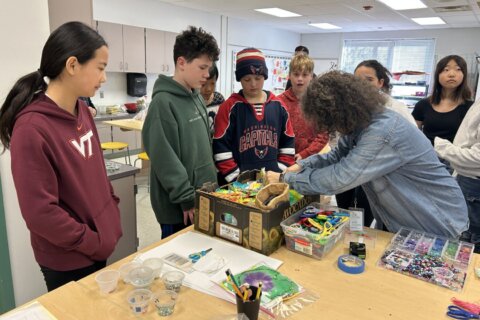This article was republished with permission from WTOP’s news partner InsideNoVa.com. Sign up for InsideNoVa.com’s free email subscription today.
This article was written by WTOP’s news partner InsideNoVa.com and republished with permission. Sign up for InsideNoVa.com’s free email subscription today.
Disability rights organizations and families have reached a settlement with Fairfax County Public Schools over school staff’s use of physical restraint and seclusion on students in special education.
But some parents who belong to the Fairfax County Special Education PTA (SEPTA) said they are concerned about how the school system plans to implement some of the new requirements stipulated in the settlement – most notably, how extensive training for special education staff will be.
“We didn’t know what to expect coming out of the lawsuit at all,” SEPTA President Michelle Cades told Inside NoVa. “We weren’t privy to anything going on with it, so we’re certainly really happy with the amount of information that has come forward. But we certainly still have questions.”
In March 2019, an investigation by public radio station WAMU revealed that Fairfax failed to report hundreds of incidents of restraint and seclusion being used on students with disabilities to the U.S. Department of Education over several years. Fairfax reported no incidents of restraint and seclusion in 2009, 2013 and 2015, when in reality the number was in the thousands.
Seven months later, three disability rights organizations – the Council of Parents Attorneys and Advocates, Autistic Self Advocacy Network and CommunicationFirst – and the families of six students with disabilities sued the school system, alleging school personnel disproportionately used restraint and seclusion on students with disabilities, causing them physical harm and psychological trauma.
Jennifer Tidd, the parent of one student, provided documents showing that her 13-year-old son, who is non-verbal and autistic, was restrained and secluded 745 times over seven years – 422 times in a general education setting and 323 more in a private contract facility run by Fairfax.
Tidd noted in the suit that on several occasions, even though her son was potty-trained, he soiled and defecated on himself to escape the room where he was being secluded. Because of these experiences, Tidd said her child has severely regressed and fears going into any room with a closed door, sleeping alone in his room and showering or bathing without a parent nearby.
In response to these allegations, in 2019, after completing an independent review of its restraint and seclusion guidelines, Fairfax created a policy banning seclusion and several forms of restraint, including prone and supine, in all Fairfax general education schools by Jan.1, 2021. Seclusion is still allowed in special education schools, including Burke School, Key Center and Kilmer Center, until the start of the 2022-2023 school year when it will be banned in these facilities as well.
In addition, the school system funded several new staff positions dedicated to reviewing special education programs and supporting special education parents. School personnel also were required to complete an online five-module training series about restraint and seclusion policies and procedures, de-escalation and prevention, by Jan. 1, 2021.
However, in early April, Inside NoVa reported that special education staff had complained to SEPTA about the online training they received, claiming the modules did not adequately prepare them for real-world issues in the classroom.
Nine months later, even with the suit settled, SEPTA’s Cades continues to hear similar complaints, especially from staff working at Comprehensive Services Sites – areas in school buildings designated for assisting special education students.
“We’ve also heard from teachers in the elementary CSS programs who have said to me, ‘We haven’t been trained yet, we don’t have these tools,’” she added.
All seclusion, restraint must be banned
Details of the settlement between Fairfax County Public Schools and the plaintiffs have not been fully disclosed. But according to a joint news release by the parties, the court has mandated that Fairfax stick to its self-imposed deadline of banning all seclusion practices and its use of physical restraints, including mechanical, chemical, prone, supine and chokehold restraints, in all schools, as well as private placement schools, by the start of the 2022-2023 school year.
Until the ban takes effect, parents can submit a letter from a qualified medical or psychological health professional stating restraint would be harmful to the student according to the news release.
Fairfax is also required to retain Ukeru Systems, a restraint-free behavioral management technique, and Dr. Ross Greene, a clinical child psychologist and founder of “Collaborative & Proactive Solutions,” as consultants to help train staff and implement a plan to eliminate the need for physical restraint and seclusion altogether. The school district must provide quarterly public reports on Greene’s recommendations and data on all acts of restraint and seclusion.
Greene, who lives in Portland, Maine, created the collaborative model to help teachers identify skills the child lacks or the expectations they have difficulty meeting with the goal of helping them solve the problem before a child’s behavior escalates.
Cades said she and other SEPTA members are thrilled to see the scope of these new requirements cover so much ground and that the school system is working with Greene (whose model they have advocated and supported in the past). But she is wary because the school system has promised change in the past, and many months later she contends school staff are still using old methods, such as seclusion, to de-escalate incidents.
“We’ve presently only heard about a select number of schools that are going to be getting the training, but we can tell you that this school year, we have heard reports of kids who are still being secluded at schools that are not on that list,” she said.
Mandatory training well underway
A spokesperson for Fairfax schools said the system began mandatory training for all staff well before the settlement. As of November, virtually all employees had completed an initial 90 minute Virginia Department of Education de-escalation training, which covers alternative strategies related to positive behavior support, conflict prevention, de-escalation and crisis response.
But Diane Cooper-Gould, advocacy chair of SEPTA and the parent of a Fairfax student with a disability, told Inside NoVa she does not believe 90 minutes is sufficient to train staff working with students in special education in any circumstance, let alone on a day-to-day basis.
“I don’t even want to call it training because it wasn’t,” she said.
“When kids started school this year, teachers could not use seclusion and they had kids who they didn’t know what to do with,” Cooper-Gould added. “They haven’t been trained in anything else and I literally sat in meetings where staff said, ‘We haven’t been trained yet.’”
The Fairfax spokesperson said Greene has conducted training sessions with special education staff at schools that had higher incidents of restraint and seclusion before the implementation of the new policy. The spokesperson added that all Fairfax schools have staff members who have received more advanced training but did not specify what the training entails or how long it lasts.
“We are already ahead of the timeline for all training sessions and reporting requirements as agreed in the settlement,” the spokesperson said.
Cades said she hopes more details about the new requirements will be made public, such as what new training staff will receive, how it will be taught and how long it will last.
“In the interim, we continue to ask questions about rollout and plans,” she said. “We recognize that it’s a really huge school system and it’s going to be a process getting everyone trained.”







